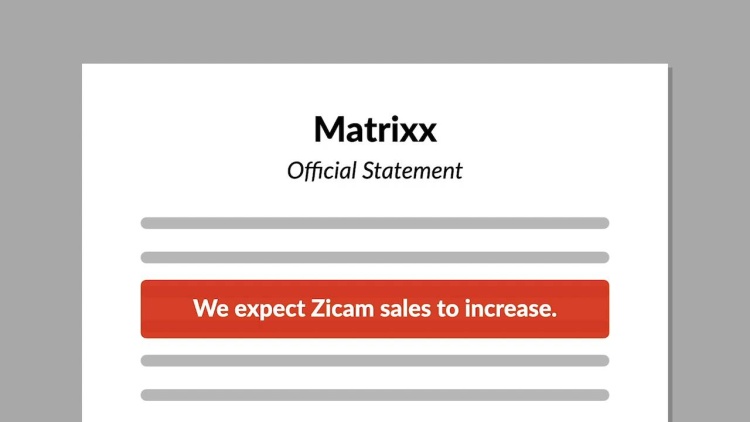Matrixx Initiatives v. Siracusano
United States Supreme Court
131 S.Ct. 1309, 563 U.S. 27, 179 L.Ed.2d 398 (2011)

- Written by Sara Rhee, JD
Facts
Matrixx Initiatives, Inc. (Matrixx) (defendant) manufactures and sells the product Zicam, a nasal spray and gel designed to combat the common cold. Beginning in 1999, Zicam received reports of a possible link between Zicam nasal spray and anosmia, which is the loss of the sense of smell. By September 2002, Matrixx had received several complaints from Zicam consumers who developed anosmia, and had hired a consultant to look into the issue. Matrixx also received case studies of Zicam consumers suffering from anosmia. In late 2003, Matrixx was sued by plaintiffs who alleged they lost their sense of smell after using Zicam. During the relevant period, Matrixx issued a series of statements indicating that Zicam would have high earnings. At no time did Matrixx disclose the adverse reports of anosmia or the existence of anosmia-related lawsuits. In response to publicity about the possible link between Zicam and anosmia, Matrixx called such allegations unfounded. A class of Matrixx investors who purchased stock between October 22, 2003, and February 6, 2004 sued Matrixx, claiming that Matrixx made misleading statements by failing to disclose reports that users of Zicam nasal spray suffered from anosmia. The District Court dismissed the complaint, reasoning that the plaintiffs failed to show that Matrixx had received a statistically significant number of adverse reports, such that Matrixx would have been required to disclose them. The District Court also held that the plaintiffs did not allege facts that led to a strong inference of scienter. The Court of Appeals for the Ninth Circuit reversed, stating that statistical significance was not required. It also found that Matrixx’s withholding of adverse reports gave rise to a strong inference of scienter. This Court granted certiorari.
Rule of Law
Issue
Holding and Reasoning (Sotomayor, J.)
What to do next…
Here's why 907,000 law students have relied on our case briefs:
- Written by law professors and practitioners, not other law students. 47,100 briefs, keyed to 996 casebooks. Top-notch customer support.
- The right amount of information, includes the facts, issues, rule of law, holding and reasoning, and any concurrences and dissents.
- Access in your classes, works on your mobile and tablet. Massive library of related video lessons and high quality multiple-choice questions.
- Easy to use, uniform format for every case brief. Written in plain English, not in legalese. Our briefs summarize and simplify; they don’t just repeat the court’s language.





